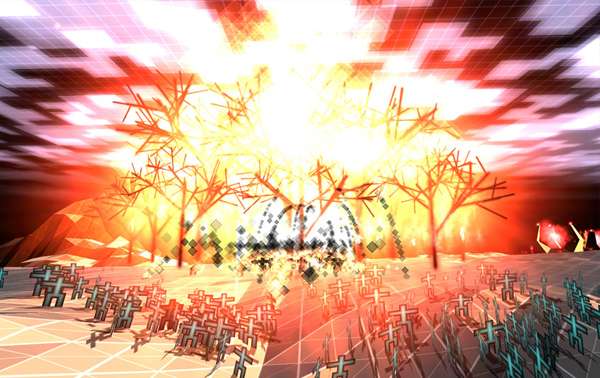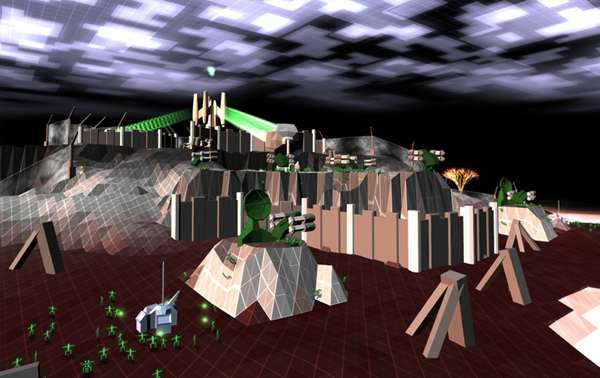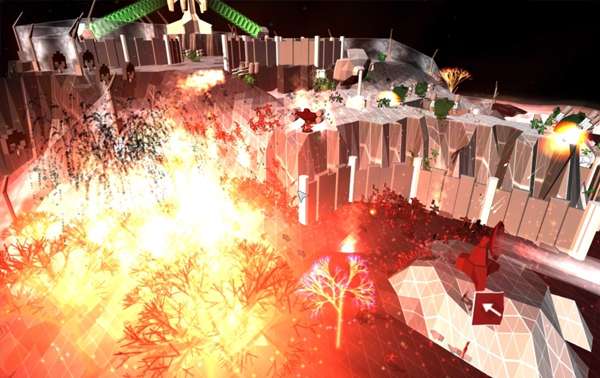
Multiwinia PC Review
My main problem with RTS games as of late is that the ‘strategy’ side of things tends to take a backseat to simply getting a rock, paper, scissors-esque advantage over your opponent, where the person who holds the most troops tends to win. While Multiwinia has tried to address these concerns, doing its best to try and break the mould, sadly therein lies its strengths and weaknesses.
Those who played Darwinia, the previous title from the same team, will be greeted to a friendly hello from their favourite 2D combatants. Locked into an eternal war in a Tron-like computer system, the Darwinians make it their mission in life to destroy/delete the opposing teams, purely because of their differing colours. Because everyone loves a strategy game with racist undertones.

When I started playing the game, I was pleasantly surprised by the simple ingenuity of it all. Although I could see its shortfalls initially, as is often the way with this type of game, the proof is in the 2D pudding and it seemed that simple, constant and meaningful decisions could be the most rewarding. Trouble is, that thinking quickly drops into the crapper when you watch yourself spiraling into an unexplained defeat for the 20th time. In a childish act of rebellion against the game I am now going to explain the strategy concepts in as short a statement as possible, in an attempt to mock it: You make platoons of Darwinians who are stronger from the front, and the more spawn points you hold, the more troops you get. Ta-dah!
This thinking intrigued me at first, and I applauded the developers’ decision. Rather than resource-gathering and having to constantly instruct your facilities to construct troops, the game throws all of that to one side as a given, and gets you straight into commanding your units, and directing them to their glorious deaths. The strategy side comes into play when you’re sending your troops to the most important position on the map, and enforcing standing orders at your spawn points for troops to proceed to a location as soon as they can. The game then takes an interesting step in another direction, where constant enforced and repetitive assault is the key to victory (in theory) rather than one large wave of troops. This means that the battlefield is constantly full of action, with advancing friendlies, retreating enemies, new spawns every few seconds and random crates to collect.

That’s right, crates – a la Worms or Mario Kart – and they’re the kind that are, sadly, the turning point in most close-cut battles. As is the way with recent games, you can’t allow a situation which is based on skill, forethought and planning to be the reason why you win. It has to be a randomized system involving over powerful weapons that give you the advantage you need. I understand the excitement of random happenstance where a drop saves you, or turns the tide in your favor. And I understand the fact that without a randomised crate-dropping system to liven it up, a game like this runs the risk of becoming a completely linear bore. And it’s not like I was ever in a position where I was winning until a crate ruined it for me, because I actually just suck at this game. It just seems that ‘random’ is a word too readily accepted in games that, in essence, are poorly designed and aren’t very fun.
Aside from the “Here’s more troops, USE THEM!” spawning system, the game takes another unique approach with bite-sized games. If you’ve ever sat through a see-sawing RTS game before, you know that they can sometimes last ridiculous amounts of time with very little enjoyment throughout. Multiwinia’s best quality is the fact that, whether you’re losing or winning, you’ll most likely be finished inside of ten minutes. Ready to go onto the next game mode, or contemplate your swift and humiliating defeat in preparation for next time.
The game has multiple modes: Rocket Riot requires the capturing of solar panels to harvest their output for rocket fuel. King of the Hill involves holding marked locations to gain more points than your enemy. Blitzkrieg is similar to King of the Hill, except the sectors you capture contain flags that are raised and lowered, not unlike the standard game mode in the Battlefield series. Assault mode has one side defending a base while another attacks. Domination is a free for all. Capture the Statue has your Darwinians lug statues back to your base for points, while the enemy is attempting to do the same and prevent you from capturing any. But all of them are adaptations on a theme, with very little difference between them, the only thing to spice them up being multiple enemy forces, or playing online with other equally bored humans.

Multiwinia isn’t a bad game; the unique art style and hypnotic laser fire are enough to keep it visually entertaining for hours (kind of like when you watch a moth attack a lava lamp). But once you’ve penetrated the outer crust of the game’s strategy, there really isn’t much more to the plain and inconsistent innards. Some people would call this its strength, opting for fast-paced decision making, and short battles. But those looking for more from their strategy games will be left wanting, and may even find that the battles are coming to an end long before you can mount a suitable retaliation, which is half the fun of a decent strategy.
Get your gob round the free demo, and make up your own mind. There’s a lot to like, and equally as much to dislike. Just promise me to you’ll get online and make your friends weep before your pixelated 2D justice.
